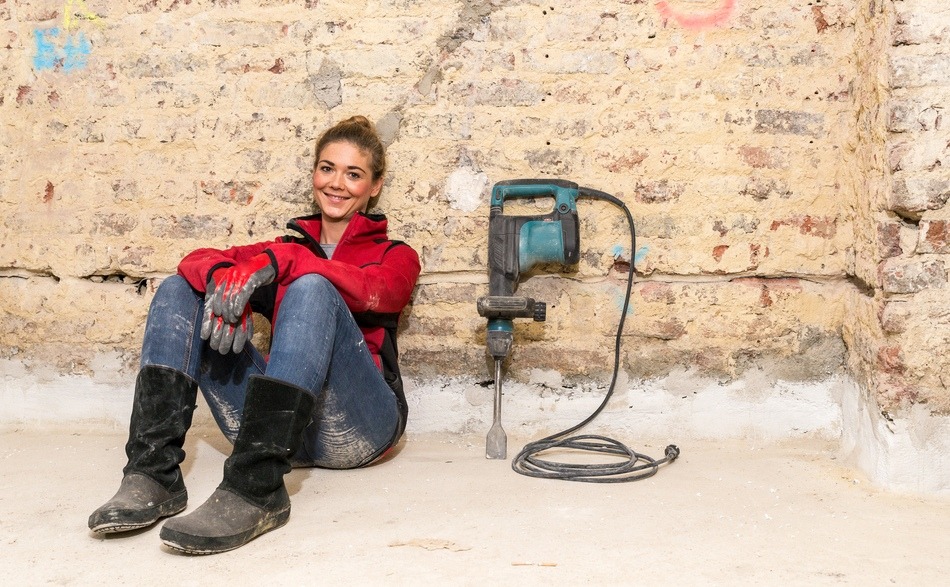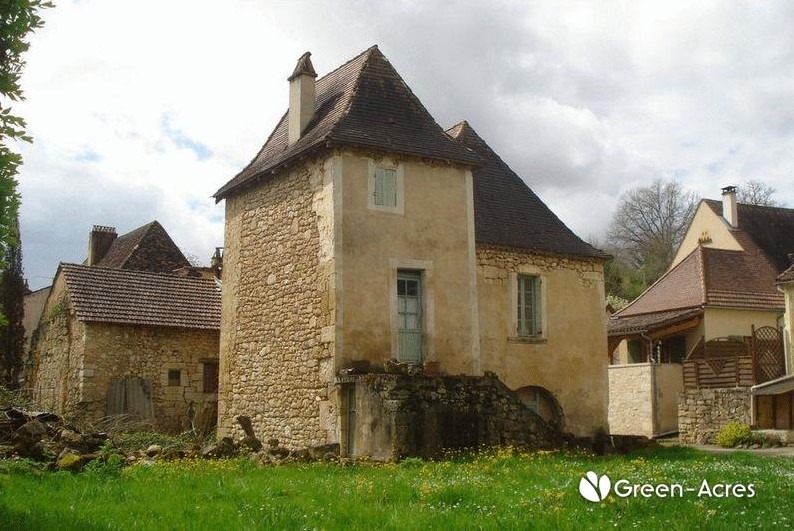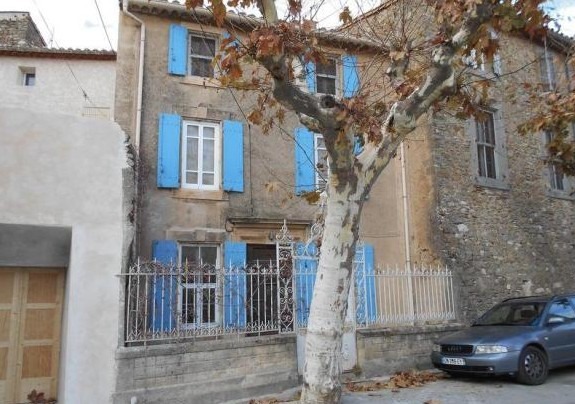Most of us have gazed at a French cottage on the verge of collapse, a chateau that’s gone to seed or an apartment on a boulevard that’s seen better days, and wondered how beautiful we could make it. We’ve imagined the joy of rescuing a ruin and creating something wonderful. We’ve considered the profit! But could you handle a French property renovation?
Many British people dream of renovating a property in France. There are so many old, beautiful and quite substantial properties which seem to be begging for someone to come and rescue them. Many come with land, that in England would have been built on years ago. Pricewise, it is perfectly possible to find a house for less than the cost of a car in France. Tempting isn’t it? But what are the pitfalls and is it really worthwhile?
A professional French builder will advise anything from €700 to €1,200 per square metre.
The first thing to consider is your budget. Generally speaking, a professional French builder will advise anything from €700 to €1,200 per square metre. This will vary greatly depending on the finish required, types of material etc. You must always have a contingency fund on the ready too; it is so important to be realistic.

If you’re ready to get your hands dirty, France has the property for renovation
When we were searching for our French home, we knew we wanted a project and we found one. It’s a 19th century village house with high ceilings, original features, marble fireplaces and a garden. Well, it was more like a jungle at that stage. We took it on: it was habitable but needed a kitchen, bathrooms, new wiring, plumbing and full decoration. Eight years down the line it is not only very beautiful but it has increased in value. The hard work was worth it!
It will be vital to the success of your French property renovation to fix your budget and get help with your currency. At France Property Guides we recommend Smart Currency Exchange. Read their guide, The Property Buyer’s Guide to Currency.
Find homes in France via our property portal.
Finding a renovation property in France
So where do you start in your search for a “doer upper” in France? Our first piece of advice is to make sure the roof and structure are sound. Many ancient French houses have old tiles and some lack any felt underlay. Insulating your roof is vital for all seasons.
Surveys are less common in France, the considered thinking being if a building has been there for hundreds of years it will last a bit longer! However, it may well be worthwhile having a local builder look over the house just to make sure there are no major structural problems.
If it is a second home, any profit you will have made on a resale can be offset against Capital Gains Tax.
Many old villages in France are listed and a property located close to a church or other monument will have more restrictions on external alterations. You will need to ask at your local town hall (“mairie”) and have an architect draw up proper plans and drawings. This is especially vital if, for example, you want to change the façade or create an open terrace. Your maire will likely be delighted to know you are renovating a property. Follow the rules from the outset and don’t attempt anything without planning permission.
Finding professionals
Architects and builders are easy to find in France and many speak English. Indeed many ARE English, since the Brits, Americans, Australians etc tend to show more interest in property renovation than the French. This bodes well for anyone considering renovating a property as the French welcome the improvements which any house renovation will make. They realise that we are bringing prosperity to the community.
Many French builders are real artisans and have learnt their trade from their families. However, their timing is not always so good!
Make sure you use the services of an artisan who is fully registered to work in France. Ask for his SIRET number. This means he is legally permitted to work in France and is registered for TVA (VAT). Don’t accept the first quote; get at least three quotes. Ask around for recommendations, a good builder will always be a good builder in my opinion, and vice versa. It’s all about pride in a job well done.
Employing local artisans and architects will stand you in good stead in the community. Be aware that many French builders are real artisans and have learnt their trades from their families. However, their timing is not always so good! Once you accept a quote, make sure it is a written contract with an idea of when the work will finish. You can add a penalty clause if the work is not finished by the given date.
Staying in control
If you are not able to live in the house whilst the work is going on, make a firm rule to visit regularly or have someone local check on progress. We have two lots of friends who have successfully renovated property in our neck of the woods – the Languedoc Roussillon – whilst living in the UK. They both say it took a lot longer than they had anticipated and there were several issues, albeit minor, along the way. However, they praised the actual work of their builders, who were both local.
The laid-back lifestyle in rural France is one of the many attractions, of course, but on the flipside, it does mean that progress may be much slower than you expected. It is important to factor this in.
French renovation need-to-knows
As far as general renovation goes, it is wise to gen up on how properties are built in France. An example of one major difference from the UK is that there is no ring main when it comes to electrical wiring in France. Each appliance has its own connection. A qualified electrician will know the standards (“normes” in French). You can have plug points in bathrooms, for example, but there are rules about distance from any water outlet.
Think about heating: many French homes have wood-burning stoves and fireplaces which are lovely, but it may be worth installing gas or electric central heating also, depending on how often you plan to use your property.
Plastering is different in France. The French tend to use plaster of Paris rather than an English bond coat and plasterboard is very common. Remember that old houses are likely to have walls which are not entirely flat: possibly a nice quirky feature but getting a smooth finish may be a problem.
Split the cost and double the fun? Why not join forces with others for your French property renovation? Read our guide, Buying Abroad With Family.
As for paint, this is notoriously expensive in France and often not of the greatest quality. These days there are many British sites offering good quality paint which can be delivered to France. The UK Paint Depot is one of them. Your French artisan should be able to get you trade prices in France however and we have noticed since we have been here that the quality is slowly improving.
If you are lucky enough to find a property with original tiled floors, this is a great bonus. Many old houses in France have the most beautiful floors which may need a thorough clean up but are so well worth keeping – and you will save money on carpets. We recommend wood flooring, and this is easy to find in many stores such as M. Bricolage, Brico Depot etc. Alternatively, sites like this one will help you find you wooden floor outlets in most parts of the country.
Pool rules
If your budget stretches to installing a pool, go to a recommended pool manufacturer who will be able to advise on safety. The “Raffarin” law came into force in 2002 meaning that all pools need to have some sort of recognised safety feature: either a fence around it, a pool alarm or a reinforced cover. There are many types of pool and if you have the space for one, it will be a good feature which will undoubtedly enhance the value of your property. Do check on the style and colour of the base though. Our house is directly opposite a 14th century church and we were required to have a beige base rather than a blue one.
Enjoy your renovation!
You can do almost anything you like to your property internally, unlike in the UK, but as mentioned previously any exterior alterations will require planning permission. As always, a good starting point is your local mairie. If you want to change the exterior paint colour or the shutters, there may be rules to follow.
You need to be both patient and committed to successfully do up a property in France, but the joys of having a home chosen from the bottom up by you yourself, the knowledge that you will be putting value into it and the years of pleasure you will have once it is finished make it worthwhile. There are some wonderful old houses across the country at real bargain prices.
If your heart is set on it, the results of renovating can be truly rewarding. Here are a couple of properties to get your creative juices flowing.
Dordogne country home €110,000.
This three-bedroom stone house is in a small village in Lalinde. It has a huge habitable area of over 200 square metres and a good sized garage. It has no heating apart from open fires, however, and requires a total renovation. Click the photo to see the property.
Village house in the Aude, €99,000
A pretty four-bedroom house in the Languedoc-Rousillon, what’s the catch? Well, while you can certainly live in it, most buyers will want to conduct a pretty extensive renovation. It’s in a village with shops and cafes, surrounded by the vineyards of the Minervois. This price includes the agent’s fees.
In part two of this feature we will be showing you some ideal plots for not just a renovation, but your very own grand design, from scratch!













